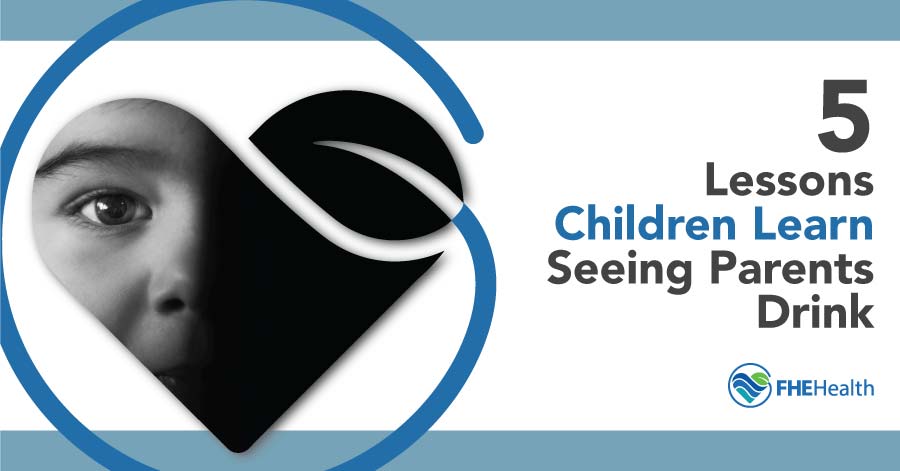
For many, parenting is one of the most challenging responsibilities they will ever take on. It turns your schedule inside out, changes your perspective on the world and those in it, and causes many to renegotiate their personal identity and roles. For those with a drinking problem, kids and alcohol become entangled with inevitably negative outcomes.
It’s often said that no child comes with a manual, but there are thousands of books, whole sections of psychology, movements, advocates, charities and schools of medicine devoted solely to the well-being of kids. It can appear that everyone has an opinion on how kids should be raised, and judgements are hurled at parents from seemingly all angles.
Kids and Alcohol
For the alcoholic parent, the pressures and responsibilities of parenting can begin to take a backseat to that next drink, and the coping mechanisms they use to manage the stress and uncertainty that every parent feels will undoubtedly harm the child. If you’ve asked yourself, “Does drinking affect my child?”, you’re likely beginning to see that it does.
A study published in 2015 on the U.S. National Library of Medicine’s site reviewing over 25,000 families in 21 previous studies concluded that the negative impacts of parents drinking around kids are nuanced and numerous and that children of alcoholics who drink in the home are far more likely to develop addictive behaviors in their later lives. Put simply, kids and alcohol don’t mix.
Remembering how small your world was as a child and yet how giant everything seemed is important when considering the impacts that a parent can have on their children. You are the beginning and end of their day, the one to ask why things are as they are, the one to rely on when new emotions prove to be too much, the inspiration and origin behind their choices and trials.
Getting drunk around kids presents them with many messages about the nature of alcohol and its effects on a person. When trying to understand how drinking around your kids affects them, it may be helpful to recall how you felt about your own parents’ drinking; the legacy of alcoholism is nurtured in the home and often carried from one generation to the next.
Your child’s entire identity and security are wrapped up in how you live your life, day to day, so getting drunk around the child teaches them several lessons throughout their formative years, like the ones we’ve outlined below.
Lesson 1. They’re Not Worthy of Your Care and Attention
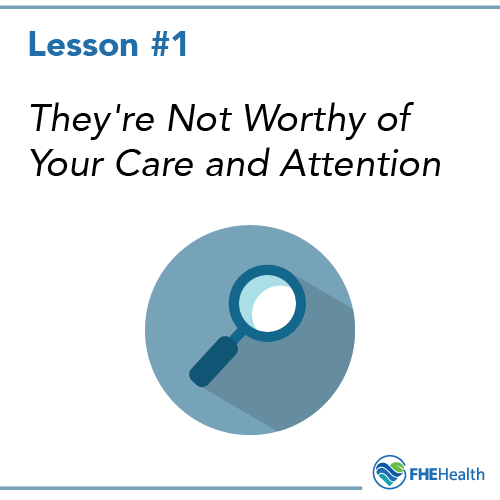 Children need to know that they can rely on their parent for all of their needs, and being engaged in a child’s world takes seemingly limitless amounts of energy. When you’re hungover or have been drinking, you’re less likely to sit down to color that picture, play with those LEGOs, build that tree house or go to that event. These are quintessential experiences that make up the foundation of an understanding of healthy relationships and, ultimately, a healthy perspective on life.
Children need to know that they can rely on their parent for all of their needs, and being engaged in a child’s world takes seemingly limitless amounts of energy. When you’re hungover or have been drinking, you’re less likely to sit down to color that picture, play with those LEGOs, build that tree house or go to that event. These are quintessential experiences that make up the foundation of an understanding of healthy relationships and, ultimately, a healthy perspective on life.
Alcohol robs you of the ability to perform the simplest of parenting tasks, and the crime ends up having the biggest impact on your child. If you’re not spending the time that you should with your child, they learn that they aren’t worthy of your attention, but the drink in your hand is. This can lead to a lifetime of unresolved confidence and self-worth issues for them.
Lesson 2. Their Feelings Aren’t Important
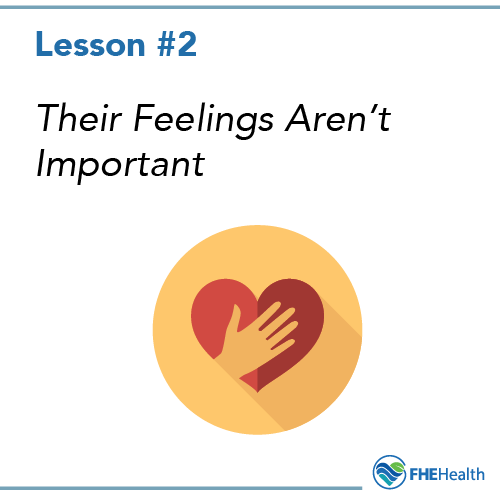 Navigating through the ins and outs of life is hard; there’s just no question about it. Uncomfortable feelings can pop up in any scenario and any time, and often, if we don’t know how to cope with them, this can lead to reactions that are unhealthy and even regrettable.
Navigating through the ins and outs of life is hard; there’s just no question about it. Uncomfortable feelings can pop up in any scenario and any time, and often, if we don’t know how to cope with them, this can lead to reactions that are unhealthy and even regrettable.
Children are dealing with new experiences all the time, and equipping them with the ability to cope with how they feel about them is one of the most important jobs a parent has. That tantrum at the grocery store is actually a request from your child. They need you to help them identify their feelings and learn how they can cope with or resolve them at the moment.
If you’re drinking to excess, your ability to help them, your patience with them and your own ability to cope are severely limited. You may even be using alcohol as a coping strategy of your own.
In the absence of the guidance they need, children develop strategies of their own, not necessarily good ones. Ultimately, they need you to validate them, but your behaviors say more to an observant child than any explanation ever will.
Lesson 3. Alcohol Is an Immediate Answer to Life’s Questions
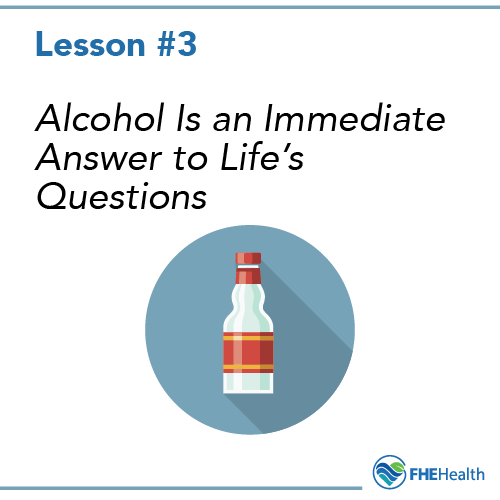 Children soak up the world around them, and when they see your reactions to the hard situations that everyone deals with, they learn that this is how to cope. When parents say things like, “God, I need a drink,” kids take these statements quite literally.
Children soak up the world around them, and when they see your reactions to the hard situations that everyone deals with, they learn that this is how to cope. When parents say things like, “God, I need a drink,” kids take these statements quite literally.
Effectively, you are telling them that you need that drink to deal with the day’s events, which they likely observed your reaction to as you were going through the motions. It may be that you do need that drink to get through, and your child sees this reaction as the solution to daily trials.
When you are drunk, whether you are upset, happy or angry, the child learns that this is how adults move through the world, and it’s likely how they will later in life too. The unfortunate reality is that using alcohol to deal with whatever might come at you is only causing more problems, not resolving them, and normalizing drinking for the child will inevitably lead to their own problems later.
Lesson 4. You Can’t Count on People to Be There for You
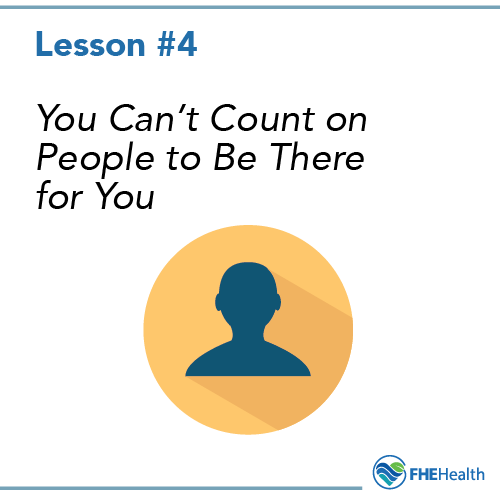 Relying on your parent for support, validation, life’s basic necessities, love and affection is innate to every child, but the alcoholic parent is often incapable of providing even the most basic needs.
Relying on your parent for support, validation, life’s basic necessities, love and affection is innate to every child, but the alcoholic parent is often incapable of providing even the most basic needs.
If the child’s experiences have taught them that turning to their parent for support with new friendships, new feelings, existing struggles or problems isn’t an effective option, they will find somewhere else to turn. As children grow, they will seek out new experiences, and those experiences can be very stressful and exciting. If they don’t or can’t come to you, and you’ve let them down before, they learn that people aren’t reliable, that they say one thing and do another.
Not only is it possible they will follow this example, but if they can’t trust you to support them when they need it, they may turn to substance abuse to soothe themselves. For the child of the active alcoholic, this is a more common outcome.
Lesson 5. Taking Responsibility and Making Healthy Choices Isn’t a Top Priority
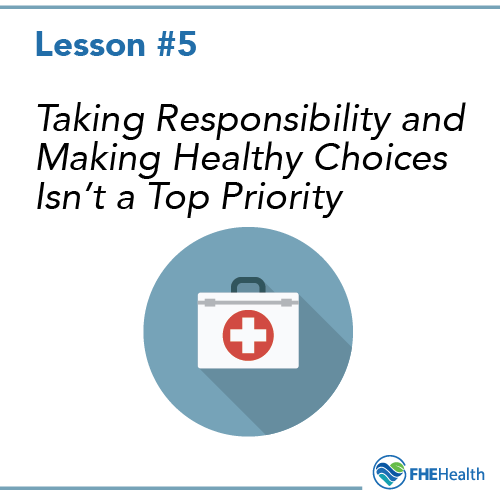 When things get really difficult, the refuge for the alcoholic is in alcohol. Of course, life is going to be hard sometimes, and when that happens, getting drunk and impairing your ability to perceive what’s going on around you may feel safe at the time, but the morning often reveals an even harder reality. This is a point where a cycle of avoidance can become insidious; you drink to avoid, and the more you avoid, the more you have to drink.
When things get really difficult, the refuge for the alcoholic is in alcohol. Of course, life is going to be hard sometimes, and when that happens, getting drunk and impairing your ability to perceive what’s going on around you may feel safe at the time, but the morning often reveals an even harder reality. This is a point where a cycle of avoidance can become insidious; you drink to avoid, and the more you avoid, the more you have to drink.
What your child takes from this is pretty apparent. Facing life’s struggles honestly with healthy coping strategies isn’t an option for children who aren’t being taught these lessons, and in the adolescent years, this becomes paramount to how your child will live their life, sometimes for the rest of their life. These impressionable years are the ones when they’re most vulnerable to picking up bad habits and relying on the lessons you’ve taught them to build up their confidence and levy their ability to thrive in the face of tougher times.
If your child thinks that taking responsibility is harder than simply avoiding it, they will, in all likelihood, take that easier option. But, as many of us have learned the hard way, people expect you to be responsible, and the easy route is often easier for a reason.
When used as a coping mechanism, alcohol and its effects on your life and those you love will impede your ability to take responsibility and act effectively in virtually all areas in your life. Your child will not only see that this is how you cope, but they will learn that the outcomes are often just how life is.
Show them a different way.
If you’re concerned about your drinking and the effect it’s having on you and your family’s quality of life, FHE Health has options and strategies tailored to each person’s situation. We can help you change the alcoholic legacy in your family and take the steps needed to reveal the best outcomes in your life. Visit the FHE website or call anytime at (833) 596-3502.






